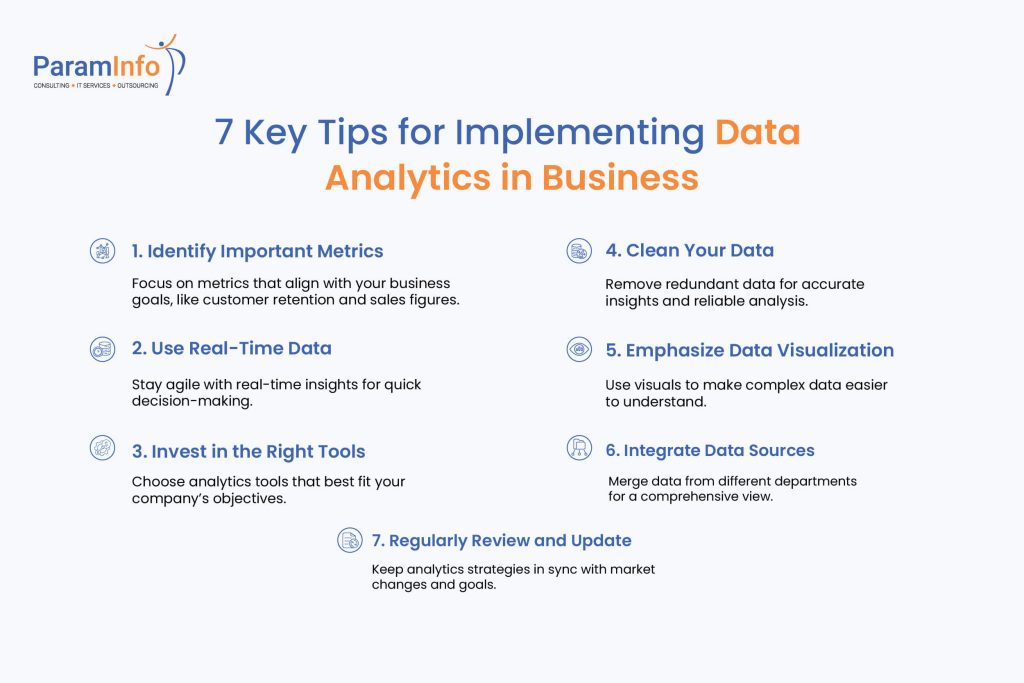In today’s global markets, where data is the driving force, a company’s ability to comprehend its data is essential to its success. Nonetheless, a business risks might fall behind competitors if it fails to seize this opportunity.
Raw data provides value on its own in businesses. To obtain the value of that data, businesses must utilize data analytics, a structured discipline that evaluates data to unveil trends, patterns and insights.
So, what are the primary benefits of data analytics?
Business executives are getting helped by data analytics in making prompt and well-informed decisions along with achieving deeper insights into their customers as well as company.
This blog will explain the best 7 benefits of data analytics and why it is important to implement in your business.
Overview of Data Analytics
The practice of data analytics involves extracting valuable insights from vast amounts of data. It comprises collecting, analyzing, and interpreting data to solve problems, answering questions and making informed decisions.
Imagine your company is employing technology that helps to sort through data and find hidden connections, patterns and market trends. That is how data analytics works its magic!
This analysis of data using a variety of methods, allows companies to:
- Pick out buying trends, and opportunities for development to get a good grasp of customer behavior.
- Make data-driven decisions by holding up strategic decisions with documentable facts rather than relying only on intuition.
- Optimize operations by reducing expenses, maximizing efficiency, and streamlining processes.
Unlock Insights with Our Data Analytics Solutions
Harness the power of data to drive informed decisions and enhance business performance
Key Benefits of Data Analytics for Businesses
Understanding the importance of data analytics is important for businesses of all kinds during the time of making informed decisions. Organizations can achieve success with a plethora of insights because of data analytics.
As per the 2022 Statista report, the domain of data analytics is expected to flourish significantly over time, surpassing 505 billion GBP in 2029.
Let’s dig deeper into the advantages of Data Analytics:
- Customized Customer Experience
By using data to track customer behavior, preferences, and purchasing patterns, businesses can precisely customize their marketing efforts to meet the requirements of individual customers. This personalized experience raises revenue and reinforces customer loyalty inside the organization. - Well-informed Business Decision-making
With data analytics, you can easily make business decisions. Companies can predict results by examining past data, patterns, and trends and making partial or minor changes to their plans. This method reduces the possibility of making an incorrect choice and raises the opportunities of success. - Smooth-running Operations
Data analytics helps organizations smoothly run their operations by pinpointing inefficiencies—inclining towards operational efficiency that results in time savings, cost effectiveness, and eventually higher profitability. - Alleviate Risks and Handle Setbacks
Data analytics can help businesses find possible hazards and obstacles prior to becoming a serious problem. By evaluating market trends and patterns, businesses can foresee future obstacles and proactively address risks. This helps an organization to save time and money. - Improved Security
In an age where cyber risks are growing more frequently, data analytics can promote security. Businesses may take preventative measures and safeguard sensitive data by using predictive analytics and anomaly detection to identify potential security vulnerabilities and threats. - Competitive Advantage
Data analytics can offer competitive advantages in the growing competitive business world. Businesses can excel over their competitors by using data analytics to understand the market, customer behavior, and operational effectiveness.
So, companies are frequently using data analytics to maximize profitability, boost operational efficiency, and gladden customers. - Motivating Innovation
Opportunities for innovation that might otherwise be overlooked can be found through data analytics. Having a deep grasp of the business’s processes, customers, and industry developments can find holes in the services or products that can be filled with original and imaginative solutions.
This may result in developing new product lines, improvements to existing services, or even the emergence of completely original business ideas. Hence, data analytics is a powerful motivator for meaningful and revolutionary innovation.

Why Implementation of Data Analytics in Business is Important?
Even if you are proficient in data analytics, you must ensure that you utilize all its capabilities in your business. Here are a few tips on why you must implement data analytics in your business to capture Benefits of Data Analytics.
- Determine Important Metrics
Determining the metrics is the first step in leveraging data analytics successfully, which is the most relevant to your company’s objectives. These include metrics such as customer retention rates, website traffic, and sales figures. - Make Use of Real-Time Data
Real-time data can identify trends and patterns. Businesses can utilize this data to react swiftly to moving market conditions and make informed decisions on the spot. - Invest in the Right tools
A few data analytics tools are accessible in the market, each with benefits and drawbacks. So, it is important to invest in tools that best suit your company’s objectives and goals. - Clean Your Data
Removing redundant, erroneous, or out-of-date information from your database regularly can significantly increase the accuracy of your results. Hence, the quality of your data determines the standard of your analyses. - Emphasize Data Visualization
Data visualization can make you understand complicated data sets. Using charts, graphs, and other visual aids, your team can analyze data more effectively and speedily. - Integrate Data Sources
Combining information from different sources might give you a more diversified picture of your company. Integrating data related to sales and marketing is one of the ways to get valuable insights for the success of your marketing campaigns. - Review and update regularly
Your approach to data analytics should adapt to the changing business environment. It is important to review and update your analytics plans often to meet changing market conditions and business goals.
In A Nutshell
Data analytics can provide numerous and substantial benefits to businesses. It drives effective decision-making and smooth operations, providing real-time insights, precise forecasting, risk reduction, and customized marketing.
By using the above-mentioned benefits, companies can improve their competitiveness and create favorable conditions for long-term growth. Thus, data analytics is a groundbreaker in today’s data-driven environment as it can transfigure unprocessed data into actionable insights.
